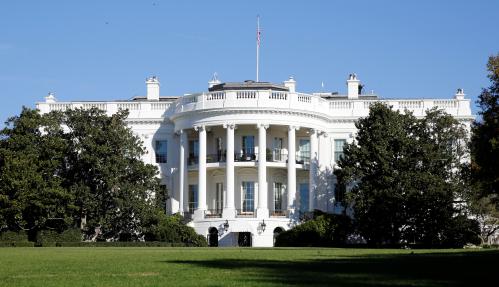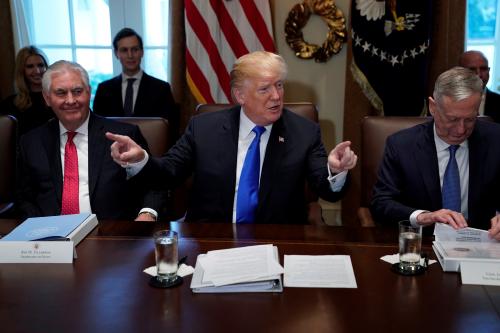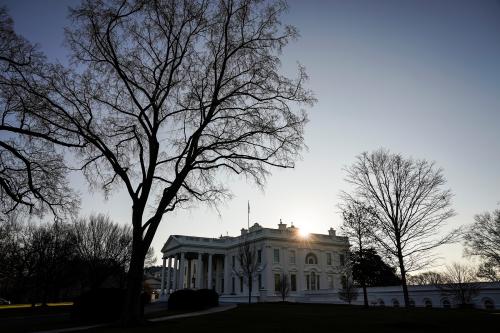Most vice presidents work hard to stay “in the loop.” But Vice President Pence had the great good fortune to be kept out of the loop on at least one very important topic. Although the Justice Department had alerted the White House that there were problems with Mike Flynn’s appointment as National Security Advisor in early January, no one bothered to tell Pence. And, in fact, Flynn lied to him about his contacts with Russia—a move that eventually got Flynn fired.
The Flynn-Pence debacle has given Pence a certain presumption of innocence that others in the administration don’t enjoy. And so when it was announced that the vice president had hired private counsel to help him navigate the rocky shoals of the multiple investigations buffeting the White House, it was assumed to be a routine response to legal inquiry, in contrast to others in the administration also hiring personal lawyers.
We don’t see too much of Pence these days. Where does he hang out?
During the week, Pence spends a great deal of time with Congress. As a former member himself, he has been the administration’s point man on nearly every issue on Capitol Hill. In fact, he has an office in the House of Representatives in addition to the traditional vice president’s office in the Senate. He speaks to House Speaker Paul Ryan and Senate Majority Leader Mitch McConnell on a regular basis.
When he is not doing the president’s work on the Hill, Pence is traveling all over the country campaigning for Republican candidates for Congress. He has already campaigned in the high-profile special elections this year and he has a busy summer schedule ahead of him. As the president’s troubles mount, Pence will become the man to try to save endangered members of Congress. If Trump is still under investigation and unpopular next year, it will be Pence, not Trump, who is the face of the administration on the campaign trail. The same thing happened in 1997 when President Clinton was under investigation for the Lewinsky scandal. Vice President Gore hit the campaign trail in place of a president under a cloud.
Unlike Trump, Pence has deep roots in the conservative wing of the Republican Party. Supporters of the powerful Koch brothers’ network see Pence as their man in the administration.
When he is not working with Congress or stumping for Republican candidates, Pence articulates American foreign policy, reassuring our allies in NATO and criticizing Russian expansionism. He regularly defends the president on foreign policy matters, echoing his message about making America great again.
Vice President Pence seems to recognize that there are times in life when a person can do well by doing good. By being a loyal soldier and helping his president with Congress, Pence is building a solid relationship with Republican members of Congress where he is well-liked.
And why wouldn’t he be? He’s a solid conservative and a Christian—as he himself says, he was Tea Party before Tea Party was popular. Moreover, as James Hohmann of The Washington Post pointed out, he’s the un-Trump. This man won’t have dinner alone with a woman who is not his wife—let alone engage in grabbing a woman’s you-know-what. He doesn’t go out of his way to insult people. He appears to have read the Constitution. No one thinks he’ll blunder us into a war. Senate Majority Leader McConnell said it more diplomatically: “I think we’ll all stipulate [Pence is] a very different kind of personality from the president and he’s in the middle of everything and it’s been great. I mean, I think he’s been terrific.”
The appeal of Mike Pence to many is rooted in a desire to get us back to some sort of normalcy in the presidency.
Come January 2019, a new Congress will convene. If historical patterns hold (the incumbent president’s party almost always lose seats in off-year elections), there will be fewer Republicans in it. If Trump can’t right the ship, 2018 could be what we call a “wave” election: depressed Republican turnout and an energized Democratic Party lead to the Democrats taking back the House.
Regardless of the outcome however, the Republicans in the next Congress will all share one thing. They will know Mike Pence. Some of them will know him through legislative work. Others will know him—and be indebted to him—because he helped save their jobs. What could that mean for the future of this administration? It is worth remembering that the members of the House of Representatives vote on articles of impeachment, and members of the Senate then hold a trial to convict an impeached president. Impeachment is a traumatic event in the life of a political party, but having a popular alternative in the wings makes it much less painful.







Commentary
President Pence?
June 16, 2017